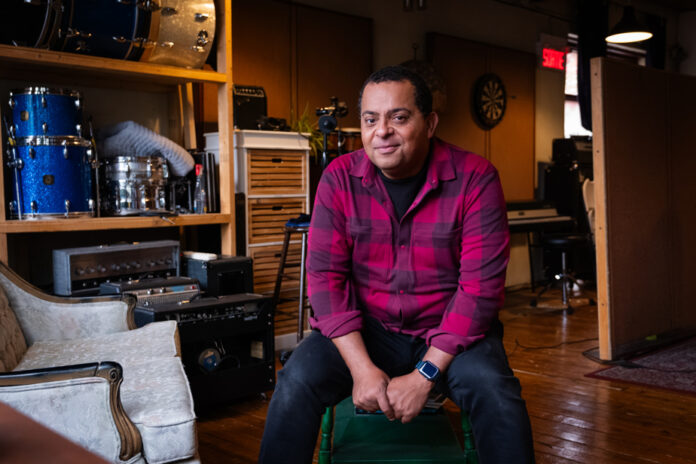The musical theater character most like Gregory Charles? The Scarecrow in The Wiz (1978), the noir version of The Wizard of Oz. But unlike this fictional creature, Gregory does indeed have a brain.
“At 55, I am still this amazed, curious kid,” confides the man who will present show 7, a celebration of the musical comedy repertoire, at Place des Arts from November 15 to 19. “The character of the strawman, he wishes to have a brain, yes, but what he wishes above all is to understand. And I want to know everything, I want to understand. » He will prove it to us over the next three hours.
Gregory Charles had barely arrived at the studio when he sat down at the piano and improvised a few jazz chords. Then, after two hours of interview, while the microphones were turned off, the musician, host and producer still stood in front of me telling me about his recent excursion, last March, on the way to Compostela.
Translation: Gregory Charles’s life is so rich and full that it is possible for him to speak for two hours without mentioning any recent accomplishment that anyone else would constantly boast about.
As in his unforgettable show Des airs de toi, broadcast from 2001 to 2009 on what was then called Première Chaîne de Radio-Canada, Gregory Charles is inexhaustible and inserts parentheses within parentheses in each of his anecdotes on Stevie Wonder, the writing of his hit I Think of You or the sex life of his parents. His reflections on music, education or faith are often accompanied by references to the universe of Marvel, Star Trek or the caveman.
To this amazed Gregory that we know from Les déréguards has been added in recent years an indignant Gregory. It is this Gregory who took up the cause, in April 2022, for an in-depth reform of our education system, in an interview given to colleague Alexandre Pratt. An outing about which the artist had been widely criticized, but which at least had the merit of placing education at the center of the media agenda for a good week.
Is he satisfied with the impact of this article? “Our collective thinking has not progressed at all on this subject, so am I satisfied? No,” replies someone who is more worried than ever not only about boys dropping out of school, but also about the sprawling social consequences of this failure. “I’ve been told a lot: ‘We love you, Gregory, but on serious subjects, you should keep your eyes shut.’ »
A suggestion to which he refuses to comply.
“The Quebec of today which fears the foreigner would have pained him deeply,” he wrote about his late father, Lennox, in A Man Like Him (Éditions La Presse), a long letter addressed to his daughter about the life of his grandfather, who, before arriving in Quebec and campaigning for sovereignty there, marched alongside Martin Luther King and demonstrated with Harry Belafonte.
Despite this paternal heritage, it took him a few years to measure the impact of his own presence on Quebec television on his community, even if he himself sometimes experienced the consequences of racism: in the early 1990s , the young twenty-something lost his first contract before the show went on the air because the sponsor refused to put his imprimatur on a project led by a black person.
This son who was born to a Trinidadian father and a Quebecois mother remembers it without bitterness, almost as if this racism had something good-natured, less harmful than that which is expressed today. Does he sense a rise in intolerance?
Quebec may well be “a corner of paradise in terms of relations with foreigners”, it is our responsibility to tame what Gregory considers to be an instinct.
“Our nature as human beings is to discriminate, it’s our first reflex,” he believes. When we have an argument with someone, we look for their difference, to spank them. It requires an educational effort, an intellectual effort, an emotional effort, of compassion, to get over that. The greatest danger is not recognizing that we are like that. »
Gregory Charles expresses himself a lot in parables – his parents were, after all, very religious – and told me this, after our interview, about Compostela, an adventure in which he embarked in the hope of meeting people, without know that in March, the paths there are deserted.
One day, as he was preparing to pack his suitcase and return to the country without having achieved his objective, Gregory came across pilgrims walking in the opposite direction to him, to whom he told them that they were the first humans he had visited. has been crossing since the beginning of his journey.
After having a bite to eat in his company, these strangers who have become his friends tell him that they will walk with him again the kilometers that they had already covered, just so as not to leave him alone.
What does Gregory Charles believe? “In full moments,” he says, in those few fleeting seconds of happiness during which ugliness, violence and suffering no longer seem to exist. Gregory believes that there is always someone, somewhere, to walk with you.
“It’s true that often, when I’m with artists, there’s a chance that I know their repertoire better than they do. But I would trade the thousands of songs I have in mind for having written two songs by Michel Rivard or Pierre Lapointe. I would trade all my musical knowledge for the genius of Vincent Vallières, Ariane Moffatt, Paul Piché or Richard Séguin. »
“My father always told me that a little injustice is a big injustice, and if you don’t try to fix them all at once, you’ll never, ever get there. »
“I don’t even know if they know what a fan I am and how many times I’ve seen them perform. Karkwa is a group like Yes or Emerson, Lake





